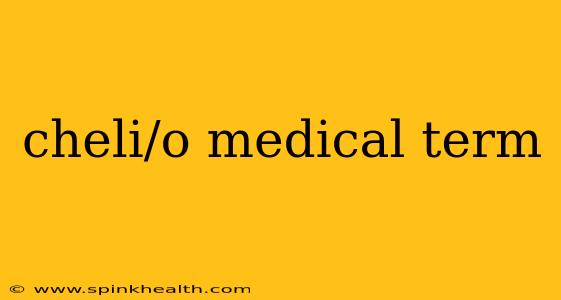Chelio: Unveiling the Mystery Behind This Medical Term
The term "chelio" might sound unfamiliar to most, but within the world of medical terminology, it holds a specific and important meaning. It's not a standalone diagnosis but rather a prefix that indicates a relationship to the lip. Understanding its role helps decipher various medical conditions and procedures related to this often-overlooked part of the face. Let's delve into the fascinating world of "chelio" and explore its significance in the medical field.
My journey into understanding "chelio" began with a simple Google search. I encountered various medical terms starting with "chelio-," each pointing towards a condition or procedure involving the lips. This piqued my curiosity, prompting a deeper dive into medical dictionaries and anatomical texts. What I uncovered was a surprisingly rich tapestry of information, showcasing the importance of precise medical terminology in accurately describing complex conditions.
What does chelio- mean in medical terms?
The prefix "chelio-" is derived from the Greek word "cheilos," meaning "lip." Therefore, any term beginning with "chelio-" relates to the lips, their structure, function, or associated conditions. This simple understanding unlocks the meaning of many complex medical terms. For example, cheilitis refers to inflammation of the lips, while cheiloplasty describes surgical repair of a lip defect.
What are some medical terms that start with chelio-?
Several medical terms utilize the "chelio-" prefix, each with its own specific meaning:
-
Cheilitis: This is perhaps the most common term associated with "chelio-." It refers to inflammation of the lips, which can manifest in various forms, including angular cheilitis (inflammation at the corners of the mouth) and exfoliative cheilitis (peeling and scaling of the lips).
-
Cheiloplasty: This term denotes surgical reconstruction or repair of the lip. It's often employed in cleft lip repair or in the correction of other lip deformities.
-
Cheilorrhaphy: This refers to the surgical suturing or closing of a lip wound or defect.
-
Cheiloschisis: This is a medical term for a cleft lip, a congenital condition where there is an incomplete fusion of the lip during fetal development.
What causes cheilitis?
Several factors can contribute to cheilitis, including:
-
Allergic reactions: Certain cosmetics, foods, or medications can trigger allergic reactions, leading to lip inflammation.
-
Infections: Viral, bacterial, or fungal infections can affect the lips.
-
Environmental factors: Exposure to sun, wind, or extreme temperatures can irritate the lips.
-
Nutritional deficiencies: Deficiencies in certain vitamins, such as B vitamins and iron, can also lead to cheilitis.
How is cheilitis treated?
Treatment for cheilitis depends on the underlying cause. It can range from simple measures like applying lip balm to more intensive treatments such as antibiotics or antifungal medications for infections. In some cases, allergy testing may be necessary to identify triggers. Always consult a healthcare professional for a proper diagnosis and treatment plan.
Can cheilitis be prevented?
While some cases of cheilitis are unavoidable, certain preventive measures can reduce the risk:
-
Protecting lips from sun and wind: Using lip balm with SPF protection is crucial.
-
Maintaining good oral hygiene: This helps prevent infections.
-
Identifying and avoiding allergens: Paying attention to potential triggers can help prevent future occurrences.
-
Addressing nutritional deficiencies: Ensuring a balanced diet rich in essential vitamins and minerals is vital.
Understanding the "chelio-" prefix provides a crucial foundation for comprehending various medical terms related to the lips. This knowledge allows for better communication between healthcare professionals and patients, ultimately leading to improved diagnosis and treatment of lip-related conditions. Remember, while this information is valuable, always seek professional medical advice for diagnosis and treatment of any lip-related concerns.

